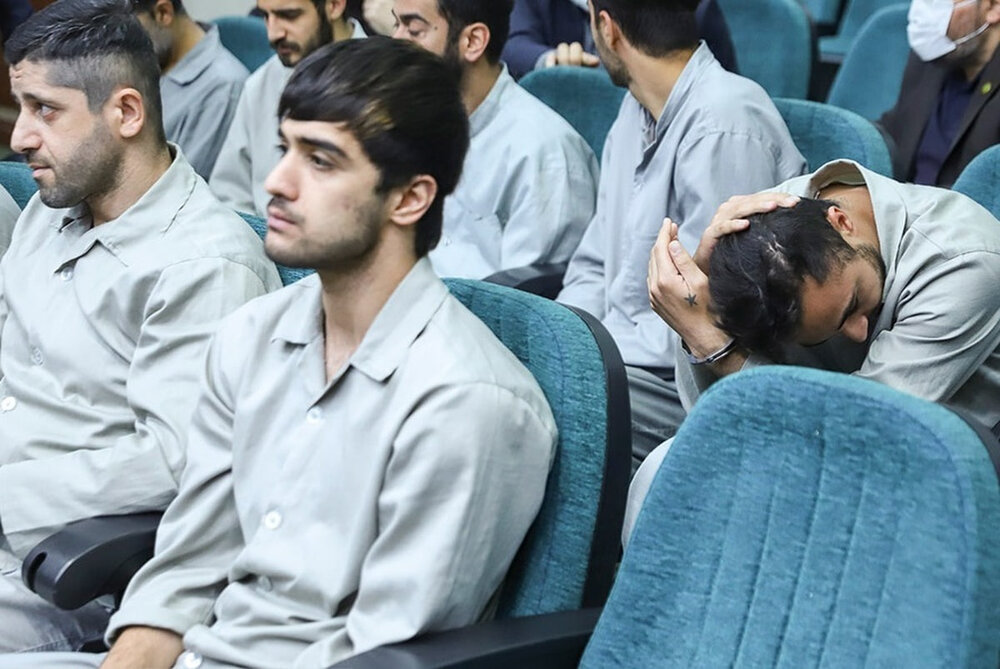Innocent killers!

TEHRAN – The execution of two convicted of killing a Basij member in the recent wave of unrest has sparked huge Western criticism, which observers say has little to do with human rights.
Mohammad Mehdi Karami, 22, and Mohammad Hosseini, 39, were hanged early morning on Saturday. They were part of a group of defendants who were brought to court in the Ajamian murder case. Karami was the first-row defendant while Hosseini was the second-row one.
Basij member Ruhollah Ajamian was killed on November 3 in Karaj, 40 kilometers west of Tehran, during a violent riot. On the day of the incident, Ajamian was trying to open the Karaj-Qazivn highway, which had been blocked by rioters.
Tasnim said that the Basij member was beaten to death by rioters with stone, knife, machete, and brass knuckles.
A group of rioters, including those executed on Saturday, were later arrested and put to trial. During his trial, Karami said that a large number of rioters delivered blows to Ajamian. He also said that he hit Ajamian with a stone in the head. “After I hit him with a stone, I slapped him in the head three times,” Karami said in the trial, according to confessions carried by Iranian media.
Hosseini also recounted how he hit Ajamian with a knife. He said he stabbed Ajamian three times. The court sessions were held several times. After hearings, the jury sentenced five defendants to execution. The defendants objected to the ruling. Therefore, the Supreme Court overturned the earlier decision on the three defendants but it upheld the death penalty against Karami and Hosseini.
After their execution, speculations abounded that they had not had lawyers. But Iranian media reported that the reason Karami did not have an attorney was that he did not hire one and that the court appointed a lawyer for him. Unlike Karami, Hosseini had hired a lawyer who worked on his case.
Another issue with the execution of the two men was that they did not meet their relatives before their executions. According to media, Karami had met with his parents and brother last week. But Hosseini did not have relatives to visit him.
Karami and Hosseini were charged with Moharebeh, which literally means waging war on God. It is applied to someone who takes up arms with the aim of killing, terrorizing, and harassing people in such a way that causes insecurity.
Observers believe that Karami and Hosseini fell victims to incitement from the West. They, along with millions of Iranians, were encouraged to take to the streets and wage riots. And they did so.
The West, observers say, is not in a position to criticize Iran. First, because its track record in violating human rights is glaring. Second, it was the West that destroyed the lives of some Iranian youth by encouraging them to commit violence.
However, European countries continue to shed crocodile tears over the executions in Iran. Over the last few days, the European Union and a number of European countries summoned Iranian ambassadors in protest over the executions.
“Secretary-General of the European External Action Service (EEAS) Stefano Sannino summoned today, on behalf of the High Representative, the Ambassador of the Islamic Republic of Iran to the European Union Hossein Dehghani to reiterate the European Union’s strong appalment over the execution on 7 January of Mohammad Mehdi Karami and Seyyed Mohammad Hosseini arrested and sentenced to death in connection with the ongoing protests in Iran,” the European Union said in a statement on Monday.
France, Germany, the UK, Denmark, and Belgium also followed suit. They summoned Iranian diplomats in protest over the executions.
“Together with like-minded EU member states, we will summon the Iranian ambassador. New EU-sanctions are on the table,” Belgian Foreign Minister Hadja Lahbib said on Twitter.
German Foreign Minister Annalena Baerbock went so far as calling for designation of the Islamic Revolution Guards Corps (IRGC) as a terrorist organization. She described such a move as politically important and making sense. She also implied that Berlin is working with the European Union to list the IRGC, a move that will further complicate the relations between Iran and the West particularly in the field of nuclear talks over reviving the 2015 Iran nuclear deal, officially known as the Joint Comprehensive Plan of Action (JCPOA).
Leave a Comment